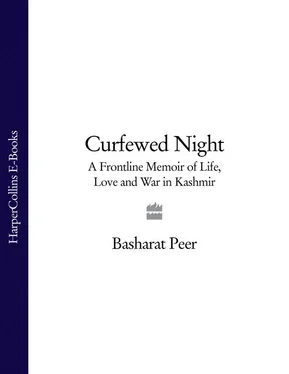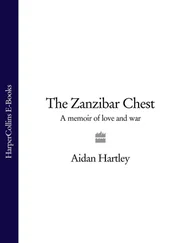In the summer of 1988, a year after the troubled elections—when I was eleven—Father sent me to a government-run subsidized boarding school in Aishmuqam, a small town five miles from my village. I was bad at sports and spent long happy hours in the library reading Stevenson, Dickens, Kipling, and Defoe. I saw less and less of Father, as he had been transferred to Srinagar, the Kashmiri capital. But when we were home together, we took our usual places, and Father taught me poetry. He would recite a few verses from a poem and say, “If you explain the meaning, you will get two rupees.” It was a lot of pocket money, and I tried hard.
In December 1989 I returned home for my winter holidays, hoping to join Father for the winter vacations in Srinagar. A week later, a group of armed young Kashmiris, led by a twenty-one-year-old named Yasin Malik, kidnapped the daughter of the federal Indian home minister. Malik and his comrades demanded the release of their jailed friends. After negotiations, the Indian government gave in. People cheered for the young guerrillas.
Yasin Malik, who led the militants of the Jammu and Kashmir Liberation Front (JKLF), had been one of the polling agents arrested and tortured after the rigged elections of 1987. The bottled-up resentment against Indian rule and the treatment of Kashmiris erupted like a volcano. The young guerrillas led by Malik and his friends, challenging India, were seen as heroes—most of them had received training in Pakistani camps between early 1988 and late 1989, and they had in turn secretly trained many more within Kashmir. In the next two months, the Indian government responded ruthlessly. Hundreds were killed and arrested after Indian troops opened fire on pro-independence Kashmiri protesters. It was January 1990. I was thirteen.
The war of my adolescence had started. Today I fail to remember the beginnings. I fail to remember who told me about aazadi , or freedom, who told me about militants, who told me it had begun. I fail to remember the date, the name, the place, the image that announced the war—a war that continues still. Time and again I look back and try to cull from memory the moment that was to change everything I had been and would be.
The night of January 20, 1990, was long and sad. Before dinner, my family gathered as usual around the radio for the evening news on BBC World Service. Two days earlier, Jagmohan, an Indian bureaucrat infamous for his hatred of Muslims, had been appointed the governor of Jammu and Kashmir. He gave orders to crush the incipient rebellion. Throughout the night of January 19, Indian paramilitary men slammed doors in Srinagar and dragged out young men. By morning hundreds had been arrested; curfew was imposed. Kashmiris poured out onto the streets in thousands and shouted slogans of freedom from India.
One protest began from a southern Srinagar area where my parents now live, passed the city center, Lal Chowk, and marched through the nearby Maisuma district toward the shrine of a revered Sufi saint a few miles ahead. Protesters were crossing the dilapidated wooden Gawkadal Bridge in Maisuma when the Indian paramilitary, the Central Reserve Police Force, opened fire. More than fifty people were killed. It was the first massacre in the Kashmir valley. As the news sank in, we all wept. The massacre had occurred a few hundred meters from my father’s office. Mother was certain he would be safe. “He wouldn’t have gone to work on a tense day like that. He will be fine,” she said. “And he would never go near a procession,” Grandfather added. But there was no way to get the same assurance from Father by hearing his voice for a few minutes: There were no phones in our village. Grandfather walked out of the room onto the lawn; we followed him. Our neighbors had come out as well. We looked at one another. Nobody said much. Later that night I lay in my bed imagining the massacre in Srinagar.
Kashmiri mornings are full of activity. I would wake up to the banging of utensils in the kitchen; the sounds of chickens running around in the courtyard after Grandmother let them out of their coop; one or another of our neighbors herding their cattle out to graze on the mountainside; the brisk footfalls and chatter of village women passing by on their way back from the forest, carrying bundles of fir and pine branches they’d gathered for timber; the repeated honking of the first bus leaving the village calling passengers; the newsreader’s words in a flat monotone floating from our black Phillips radio on a windowsill in the kitchen.
The village was unusually silent that morning. Hasan, the neighborhood baker who always made wisecracks as we waited for him to bake fresh lawasa , looked sullen as he slapped round loaves of dough with ferocity. He stared at the flames leaping out of the oven, turned toward me, and said, “Those murderers will burn in a fire far brighter than this. I cried when I heard it on the radio last night.”
The shops did not open, and the buses did not leave the village. There was no way to reach Father. Like most people in Kashmir, we relied on the public phone at the district post office in the nearby town of Anantnag. But the post office would be closed because of the protests. Father had called a friend in Anantnag, who visited us the next day with the news of his safety. Villagers stood around repeating how they’d heard the news on the radio. I felt anger spread in me. A young man raised a slogan: HUM KYA CHAHTE? AAZADI! (We want? Freedom!) He repeated, and we repeated after him: We want? Freedom!
The protest gathered momentum. Voices that were reluctant and low in the beginning became firm and loud. The crowd began a slow but spirited march along the main street of the village. Old and young women appeared at the windows of the houses. New chants were created and improvised. A young man raised an arm toward a group of women watching the procession from a communal tap and shouted, “Our mothers demand!” The crowd responded: Aazadi! He repeated: “Our sisters demand!” The crowd: Aazadi! A rush of adrenaline shot through me, and I marched ahead of my friends and joined the leaders of the procession. Somebody who was carrying his young son on his shoulders shouted: “Our children demand!” Aazadi!
By February 1990 Kashmir was in the midst of a full-blown rebellion against India. Every evening we heard the news of more protests and deaths on the BBC World Service radio. Protests followed killings, and killings followed protests. News came from Srinagar that hundreds of thousands of people had marched to pray for independence at the shrine of the patron saint of Kashmir, Nooruddin Rishi, in a town an hour away from Srinagar. All over Kashmir, similar marches to the shrines of Sufi saints were launched. Another day I joined a procession to the shrine of a much-revered Sufi saint, Zain Shah Sahib, at Aishmuqam, near my school. A few young men led us wearing white cotton shrouds. They seemed to be in a trance, whirling like dervishes, singing pro-independence songs. I walked behind them, repeating their words in complete wonder. Men, women, and children stood on the sidewalks, offering food and beverages and showering flower petals and shireen—round white balls of boiled sugar and rice—on us, a practice held in shrines and at wedding ceremonies.
The crowd itself was a human jumble. The contractor who carried whiskey in a petrol can and the uptight lawyer who waited for passersby to greet him, the tailor who entertained the idle youth in his shop with tall stories while prodding away on his sewing machine and the chemist who would fall asleep behind the counter, the old fox who bragged of his connections with congressional politicians in Delhi and the unemployed graduate who had appointed himself the English-language commentator for the village cricket team’s matches, the Salafi revivalist who sold plastic shoes and the Communist basket weaver with Stalin mustache all marched together, their voices joining in a resounding cry for freedom. Amid the collision of bodies, the holding of hands, the interlocking of eyes in affirmation and confirmation, the merging of a thousand voices, I had ceased to be a shy, bookish boy hunched by the expectations of my family. I wasn’t scared of being scolded anymore; I felt a part of something much bigger. I let myself go fly with the crowd. Aazadi! Throughout the winter, almost every Kashmiri man was a Farhad, ready to mold the mountains for his Shirin: freedom!
Читать дальше












